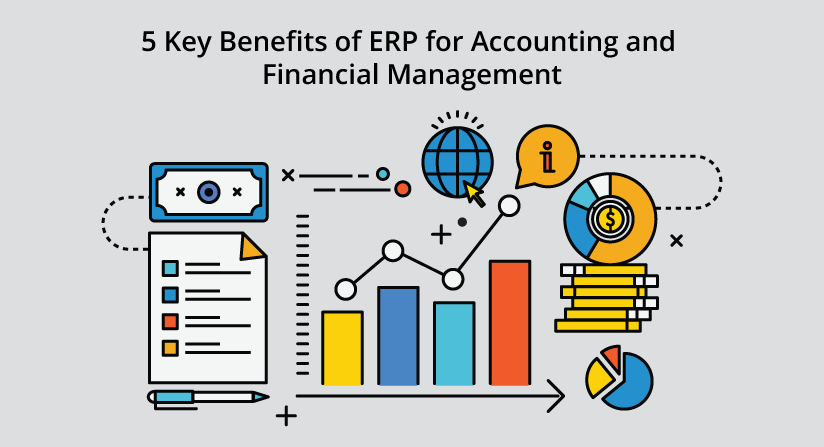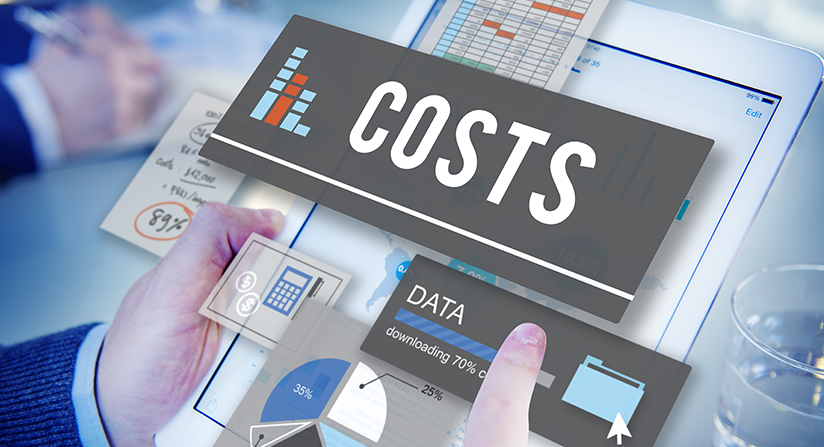Enterprise Resource Planning (ERP) software has become an inevitable part of modern businesses. It provides business functionalities that are designed to address inventory requirements, the quality of finished products, productivity, and visibility to crucial business processes.
The benefits of ERP systems are many, but how does it benefit the accounting and financial management department in an organization?
Let’s have a glance at the 5 key benefits of ERP for financial management and accounting.
1. Finance and Accounting ERP provides greater financial control through business integration
The Finance and Accounting department in every business is indispensable. The way they work can be unique and different, but the objective is almost the same in every case. Every financial manager aims at:
- improving profit margins
- minimizing expenses
- promoting savings
- ensuring safety and optimization of investments
- increasing the firm’s value
From estimation of capital requirements to disposal of surplus assets to management of cash and financial control, there are many responsibilities of the financial team. ERP lets you unify the data and bring it all together in one place.
An integrated ERP system improves cost accounting by allowing managers to accurately define budget and allocate costs for raw material, labor, transportation, and other overhead costs.
Whether making payments to vendors, paying wages to employees, or financial forecasting, an ERP system helps you to better manage all activities of a finance department. Also, when you have a single business management system, i.e. an ERP system, to look after multiple departments, you eliminate the need to work in multiple systems which minimizes costs, increases productivity, and improves processes.
2. Better tracking and management of finances with accounting and financial ERP
An ERP financial management software handles customer payment schedules, revenue tracking, and credit management across the business. ERP systems also include a CRM (Customer Relationship Management) system to automate reminders and prevent customer complaints.
With increased tracking capabilities and simple to use automated payment systems, you can easily manage billing, payments, and revenue. Finance ERP helps with cost analysis, profit tracking, invoice tracking, budgeting, investment management, and more.
3. Real-time visibility and secure financial data
When processes are well organized and resources are optimized, you can better examine future opportunities to enhance your bottom line. ERP for finance provides fast access to in-depth information so you can drill down to see what is best for your organization.
Financial data is confidential and can’t be disclosed openly. An ERP finance module allows you to safeguard your information and co-author, edit, and manage it according to the access you allow. Multiple reporting options and modules eliminate the need for maintaining spreadsheets and paper files for increased security.
4. Integrated and automated data across the organization even in multiple countries
With ERP software you get immediate data synchronization, improved data quality, and an updated view of the organization at the push of a button.
Generating information, consolidating it, and managing company-wide business processes becomes hassle-free with an ERP system. Shared management tools and integrated financial management modules track accounting data with international standards. This means you can select a framework in multiple languages, currencies, companies, and charts of accounts.
ERP systems let you gather financial data from different departments to generate reports such as the general ledger and other financial statements. Every piece of data is seamlessly integrated within the system making ERP an indispensable part of every modern business.
5. Greater financial control with GAAP compliant ERP
Generally, accounting software is not GAAP compliant, whereas a full-fledged ERP solution typically is compliant with GAAP. Adopted by the US Securities and Exchange Commission, GAAP is the accounting standard that provides a systematic methodology for recording transactions and events.
A strong ERP solution, driven by a powerful engine, encourages productive financial reporting that works well with multiple accounting standards, including GAAP.
Summary
The benefits of using an ERP system for accounting and financial management are numerous. A finance manager can understand capital requirements and manage the accounting activities of the organization with greater insight. Most business owners utilize accounting software, but with an ERP system, you get an all-in-one solution that encompasses modules for every department to include finance, production, quality, sales, procurement, and more. A manufacturing ERP financial management system provides all of those same capabilities, as well as functionality that is specific to the manufacturing industry.
Follow Us











